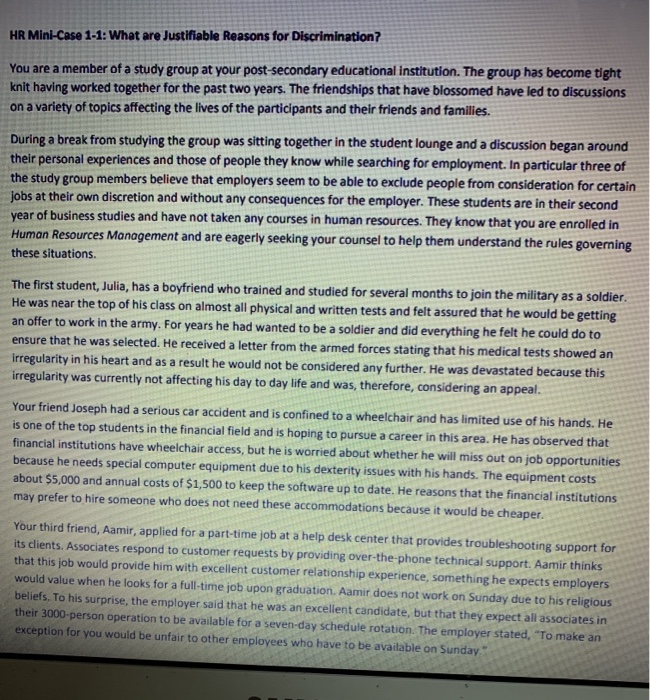help please

Question:
1. Write a response for each situations.
HR Mini-Case 1-1: What are Justifiable Reasons for Discrimination? You are a member of a study group at your post-secondary educational institution. The group has become tight knit having worked together for the past two years. The friendships that have blossomed have led to discussions on a variety of topics affecting the lives of the participants and their friends and families. During a break from studying the group was sitting together in the student lounge and a discussion began around their personal experiences and those of people they know while searching for employment. In particular three of the study group members believe that employers seem to be able to exclude people from consideration for certain jobs at their own discretion and without any consequences for the employer. These students are in their second year of business studies and have not taken any courses in human resources. They know that you are enrolled in Human Resources Management and are eagerly seeking your counsel to help them understand the rules governing these situations. The first student, Julia, has a boyfriend who trained and studied for several months to join the military as a soldier. He was near the top of his class on almost all physical and written tests and felt assured that he would be getting an offer to work in the army. For years he had wanted to be a soldier and did everything he felt he could do to ensure that he was selected. He received a letter from the armed forces stating that his medical tests showed an irregularity in his heart and as a result he would not be considered any further. He was devastated because this irregularity was currently not affecting his day to day life and was, therefore, considering an appeal. Your friend Joseph had a serious car accident and is confined to a wheelchair and has limited use of his hands. He is one of the top students in the financial field and is hoping to pursue a career in this area. He has observed that financial institutions have wheelchair access, but he is worried about whether he will miss out on job opportunities because he needs special computer equipment due to his dexterity issues with his hands. The equipment costs about $5,000 and annual costs of $1,500 to keep the software up to date. He reasons that the financial institutions may prefer to hire someone who does not need these accommodations because it would be cheaper. Your third friend, Aamir, applied for a part-time job at a help desk center that provides troubleshooting support for its clients. Associates respond to customer requests by providing over-the-phone technical support. Aamir thinks that this job would provide him with excellent customer relationship experience, something he expects employers would value when he looks for a full-time job upon graduation. Aamir does not work on Sunday due to his religious beliefs. To his surprise, the employer said that he was an excellent candidate, but that they expect all associates in their 3000-person operation to be available for a seven-day schedule rotation. The employer stated, "To make an exception for you would be unfair to other employees who have to be available on Sunday HR Mini-Case 1-1: What are Justifiable Reasons for Discrimination? You are a member of a study group at your post-secondary educational institution. The group has become tight knit having worked together for the past two years. The friendships that have blossomed have led to discussions on a variety of topics affecting the lives of the participants and their friends and families. During a break from studying the group was sitting together in the student lounge and a discussion began around their personal experiences and those of people they know while searching for employment. In particular three of the study group members believe that employers seem to be able to exclude people from consideration for certain jobs at their own discretion and without any consequences for the employer. These students are in their second year of business studies and have not taken any courses in human resources. They know that you are enrolled in Human Resources Management and are eagerly seeking your counsel to help them understand the rules governing these situations. The first student, Julia, has a boyfriend who trained and studied for several months to join the military as a soldier. He was near the top of his class on almost all physical and written tests and felt assured that he would be getting an offer to work in the army. For years he had wanted to be a soldier and did everything he felt he could do to ensure that he was selected. He received a letter from the armed forces stating that his medical tests showed an irregularity in his heart and as a result he would not be considered any further. He was devastated because this irregularity was currently not affecting his day to day life and was, therefore, considering an appeal. Your friend Joseph had a serious car accident and is confined to a wheelchair and has limited use of his hands. He is one of the top students in the financial field and is hoping to pursue a career in this area. He has observed that financial institutions have wheelchair access, but he is worried about whether he will miss out on job opportunities because he needs special computer equipment due to his dexterity issues with his hands. The equipment costs about $5,000 and annual costs of $1,500 to keep the software up to date. He reasons that the financial institutions may prefer to hire someone who does not need these accommodations because it would be cheaper. Your third friend, Aamir, applied for a part-time job at a help desk center that provides troubleshooting support for its clients. Associates respond to customer requests by providing over-the-phone technical support. Aamir thinks that this job would provide him with excellent customer relationship experience, something he expects employers would value when he looks for a full-time job upon graduation. Aamir does not work on Sunday due to his religious beliefs. To his surprise, the employer said that he was an excellent candidate, but that they expect all associates in their 3000-person operation to be available for a seven-day schedule rotation. The employer stated, "To make an exception for you would be unfair to other employees who have to be available on Sunday








